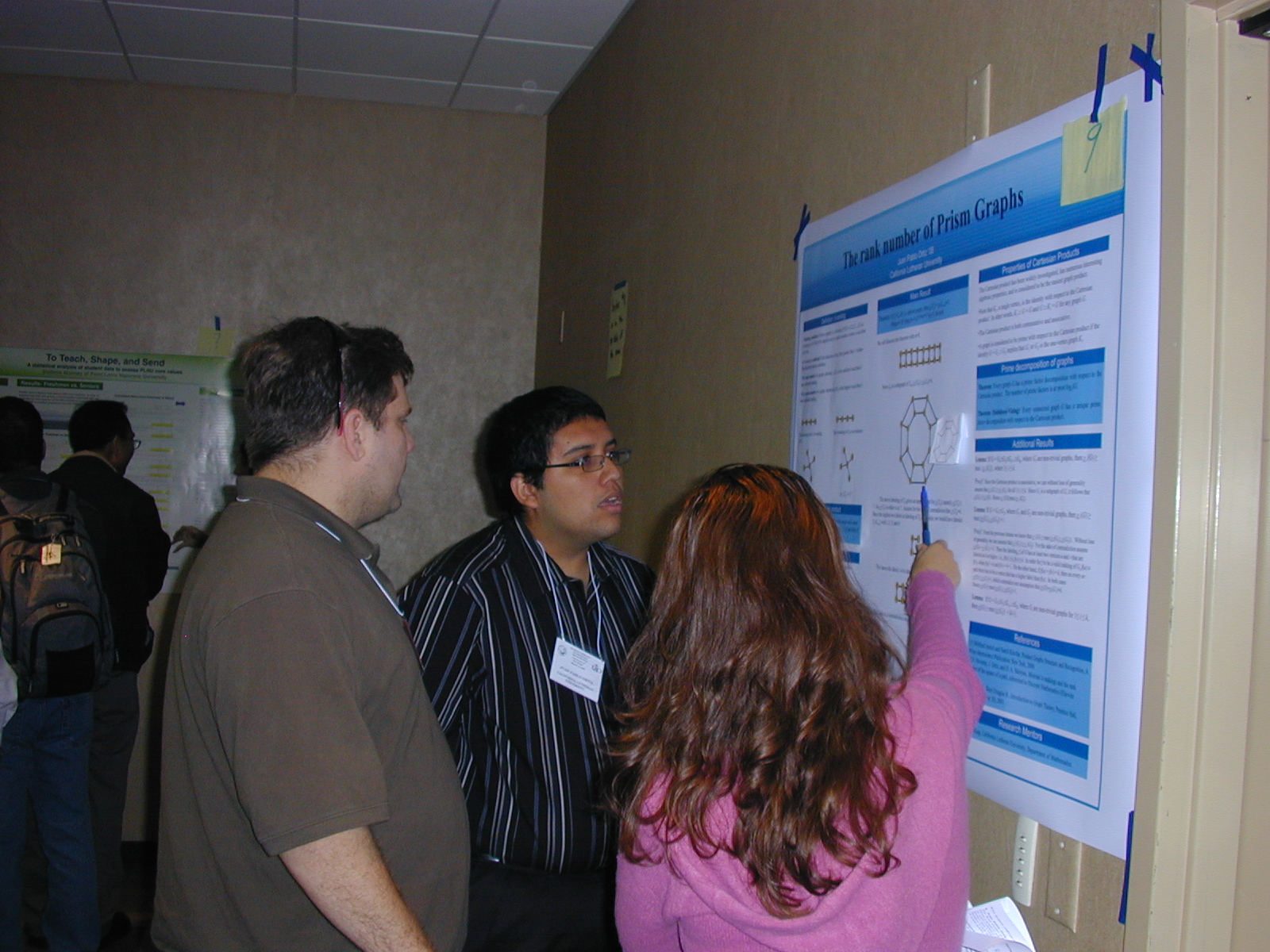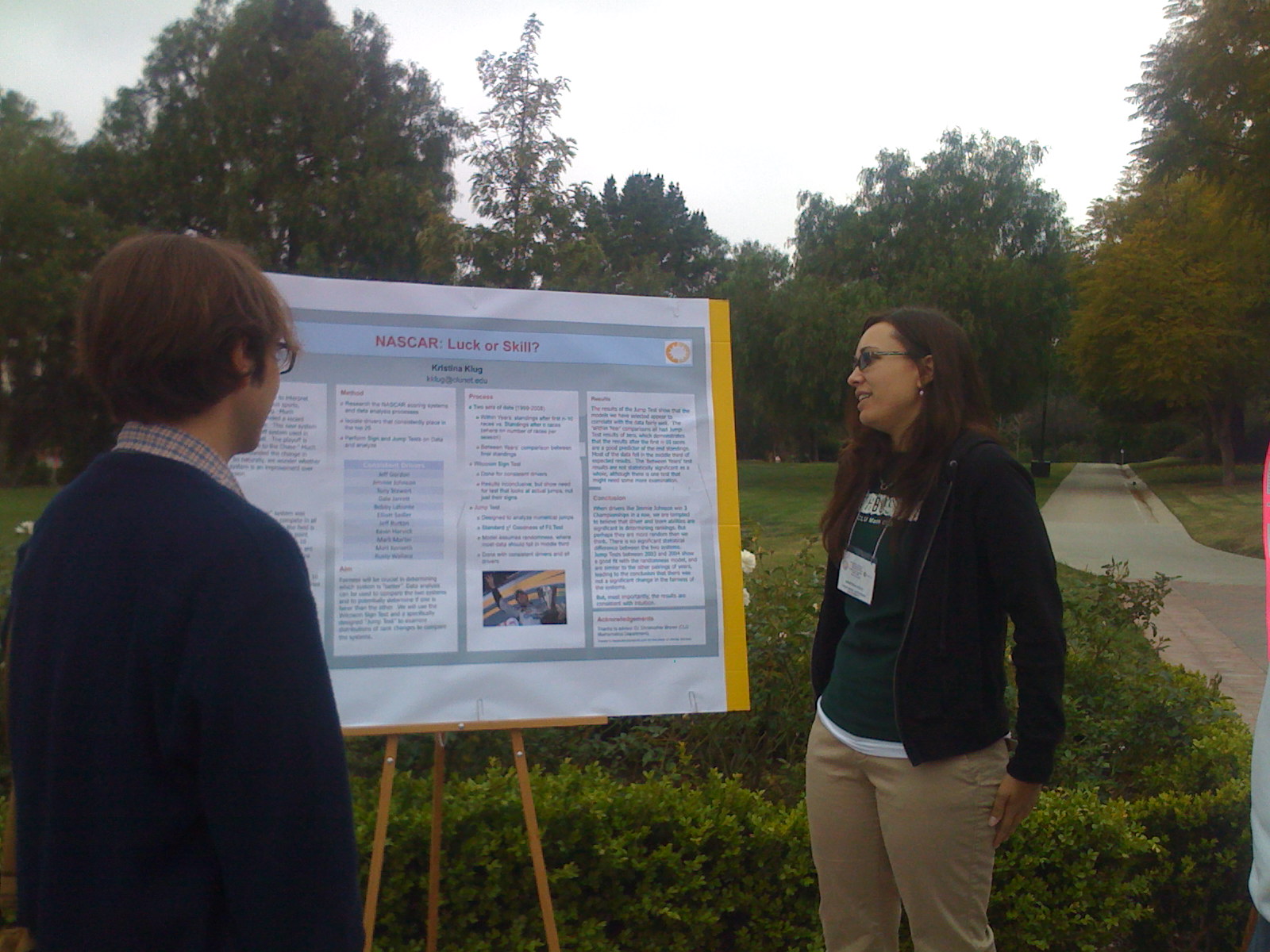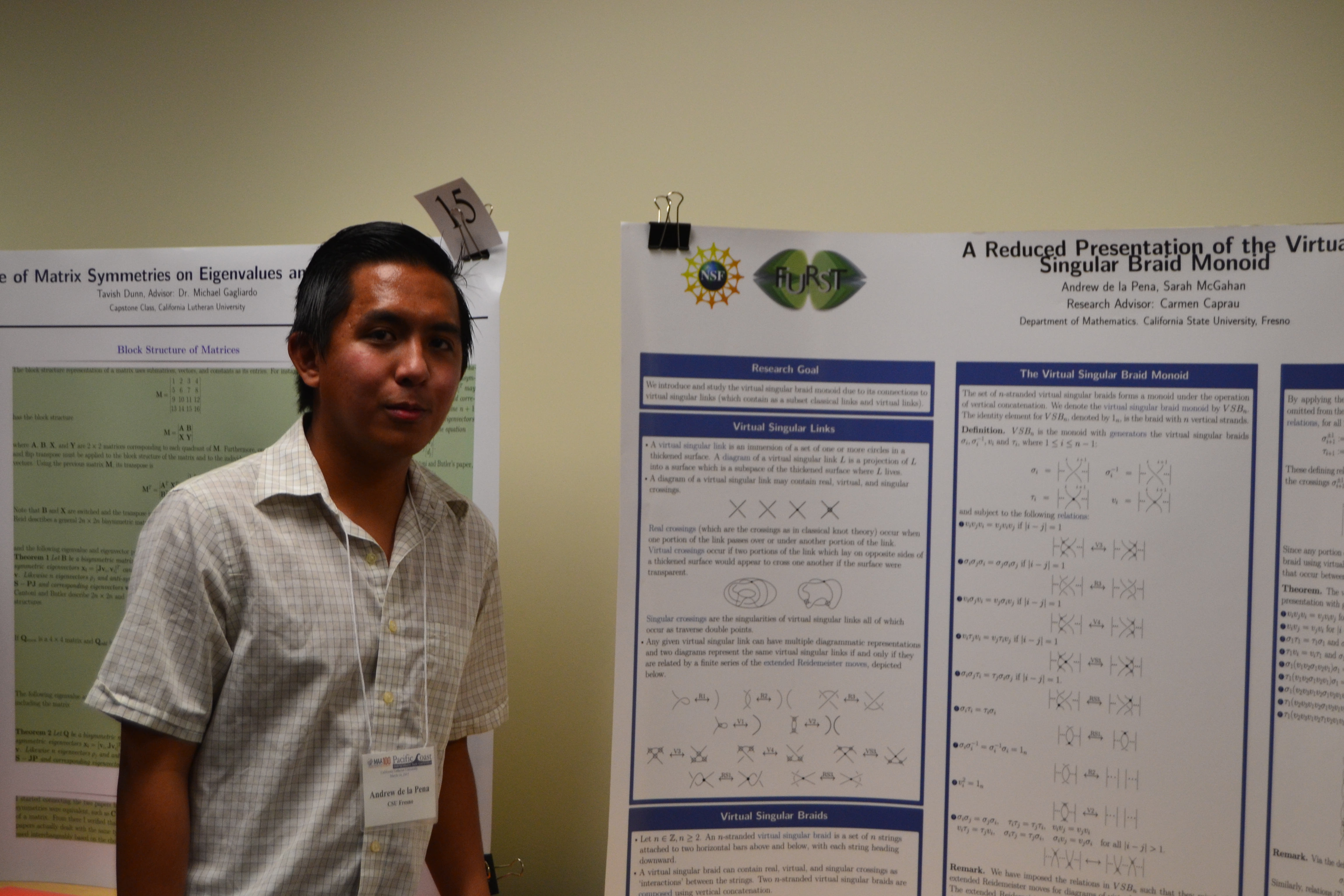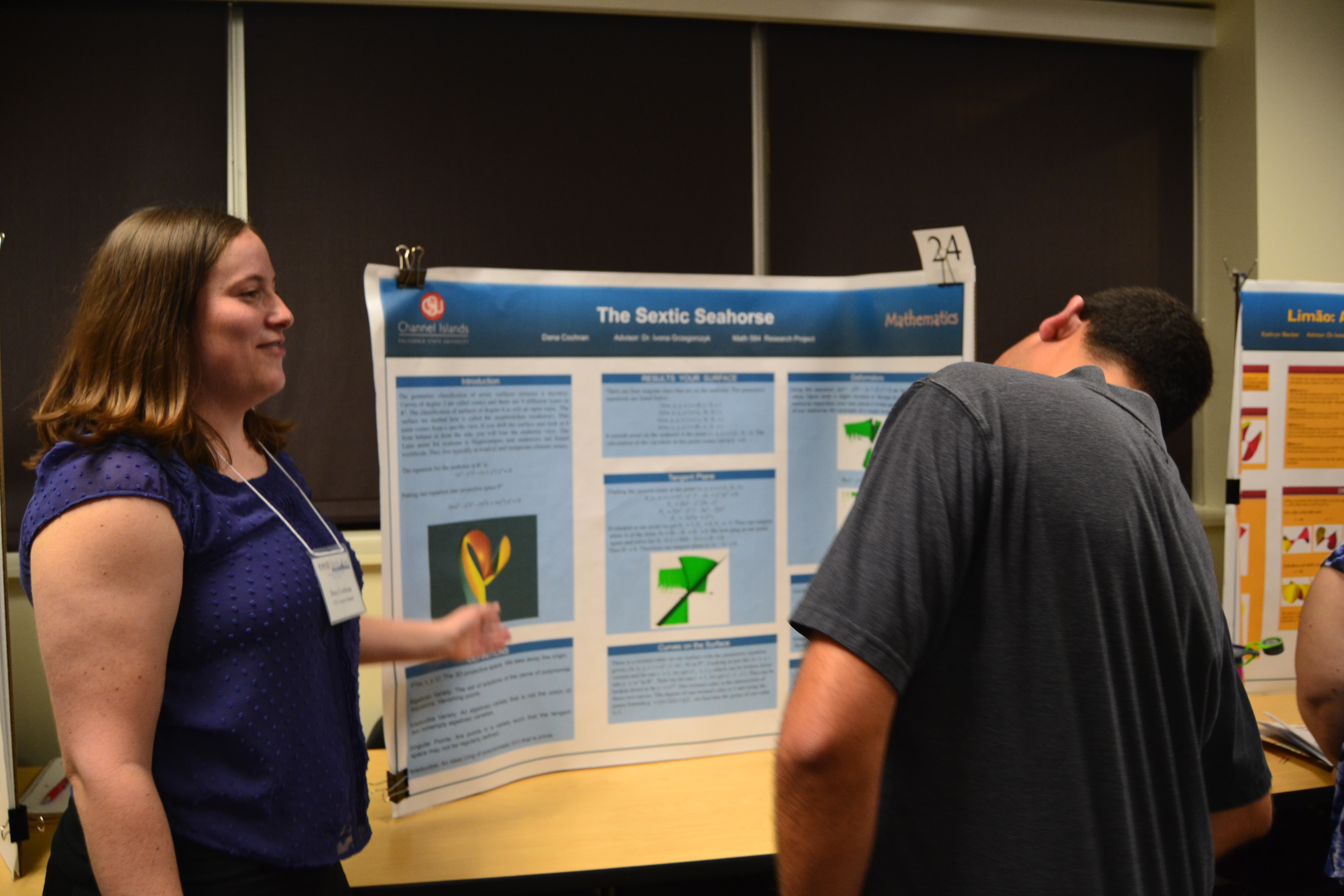Register
Click here to register on-line, and pay by credit card (deadline 5 pm, Mon April 16th).
Register for the Student Poster Session here. Poster registration deadline is Tues April 10, 12noon.
Spring 2018 SoCal-Nev Section Meeting
University of San Diego, Mother Rosalie Hill Hall (MRH)
Saturday, April 21 and Sunday April 22, 2018
(Directions and Map)
Tentative Program
- 8:00-12:00 Registration
MRH Hilton Loggia, in Mother Rosalie Hill Hall - 8:00-10:30 Refreshments
MRH Hilton Loggia - 8:30-4:10 MAA Book Sale (tentative)
- 8:50-9:00 Welcoming Remarks by local host Perla Myers, University of San Diego and past section chair Christopher Towse, Scripps College
- 9:00-10:00 Invited Address by Erik & Martin Demaine, Massachusettes Institute of Technology
Puzzles and Games Meet Algorithms and Complexity
MRH Warren Auditorium - 10:00-10:15 Section Business Meeting
MRH Warren Auditorium
Presentation by section governor/representative Curtis Bennett
Presentation of Section Distinguished Teaching Award
Recognition of 25- and 50-year members - 10:15-11:15 Invited Address by Suzanne Dorée, Augsburg University
Title TBA
MRH Warren Auditorium - 11:25-12:15 Student Poster Session
View the Call for Posters.
MRH Inner Courtyard
Organized by Roberto Rubalcaba, San Diego City College and Ryan DeMoss, California Lutheran University - 12:15-1:30 Luncheon
MRH West Plaza - 1:30-2:30 Invited Address by Kristin Lauter, Microsoft Research
How to Keep your Secrets in a Post-Quantum World
MRH Warren Auditorium - 2:30-3:00 Refreshments
MRH Hilton Loggia - 3:00-4:00 Invited Workshop by Suzanne Dorée, Augsburg University
Inquiry Based Learning Workshopp
MRH Warren Auditorium
Sunday April 22
- 9:00-10:30 Registration
MRH Hilton Loggia, in Mother Rosalie Hill Hall - 9:00-10:30 Refreshments
MRH Hilton Loggia - 9:30-12:30 MAA Book Sale (tentative)
- 10:00-11:00 Invited Address by Skip Garibaldi, Center for Communications Research for IDA
Lottery Tales
MRH Warren Auditorium - 11:00-11:15 Morning Break
MRH Hilton Loggia - 11:15-12:15 Invited Address by Darryl Yong, Harvey Mudd Collge
Title TBA
MRH Warren Auditorium - 12:15-12:20 Closing Remarks by section chair, Sam Nelson,
Claremont McKenna College
MRH Warren Auditorium
Directions and Maps
The meeting will take place in Mother Rosalie Hill Hall (see the Interactive Campus Map or a printable map with MRH highlighted). Visit the University of San Diego's Visit Campus page for directions and maps of campus.
Parking
There is free parking under the Mother Rosalie Hill Hall. Visitors may also park in any parking spot that is not restricted 24 hours. Guests may also park across the street in the Institute for Peace and Justice Parking lot, the parking lot across the street from the Shiley Center for Science and Technology, or on the street.
Hotel
The following three hotels are close to the USD campus.
The Dana on Mission Bay
1710 W. Mission Bay Drive, San Diego 92109 (4.1 miles from campus)
800-445-3339 or 619-222-6440
http://www.thedana.com
$159 Standard Room Rate per night with waived daily resort fee (value is $39 per day), and complimentary shuttle transportation to USD (attendee sign-up at front desk, limited space available). Individuals must identify themselves as part of USD Department of Mathematics at the time of making reservations in order to be eligible for the special group rate. The rate is valid until March 21, 2018 or until there are no more rooms available. Reservation requests received after March 21, 2018 will be provided on a space and rate available basis.
Days Inn, San Diego Hotel Circle
543 Hotel Circle South, San Diego 92108 (2.4 miles from campus)
619-297-8800 or 800-227-4743
www.daysinnhc.com
$84 Standard Room Rate per night, includes breakfast for 2. Please call the Reservations Department Monday – Friday, 8:00 am – 5:00 pm, and ask for the USD Mathematics Conference to receive the special rate. The rate is valid until March 21 March 30 or until there are no more rooms available. Reservation requests received after March 30 will be provided on a space and rate available basis.
Best Western Plus Hacienda Hotel - Old Town
4041 Harney Street, San Diego
619-298-4707
http://www.haciendahotel-oldtown.com/
They will hold some rooms for us at a rate of $145.00 for single and double occupancy. The rate covers their El President Program, which includes breakfast, dinner and two drinks daily for (1) person. If an additional person would like the benefits, the cost is $25.00.Taxes and fees in San Diego are 12.5%. They also have a Facility Fee per night of $8.00 per room (this includes round trip airport transportation, a welcome cocktail, 2 bottles of water in each guestroom daily, coffe/water/newspapers in the lobby daily).
Registration Fees
| Registration | |
| Nonmember | $60 |
| MAA Member | $55 |
| Student | $15 |
| Taquero Cart Lunch featuring chicken and beef , rice, refried beans, fresh salsa with chips |
|
| Add Lunch | $12 |
On-site registration will be available for the meeting, but will be $5 more than the pre-registration charge.
Register on-line
Click here to register on-line, and pay by credit card (deadline 5 pm, Mon April 16th).
Questions about registration? Contact Ernie Solheid, esolheid at fullerton.edu
Erik & Martin DemaineMassachusetts Institute of Technology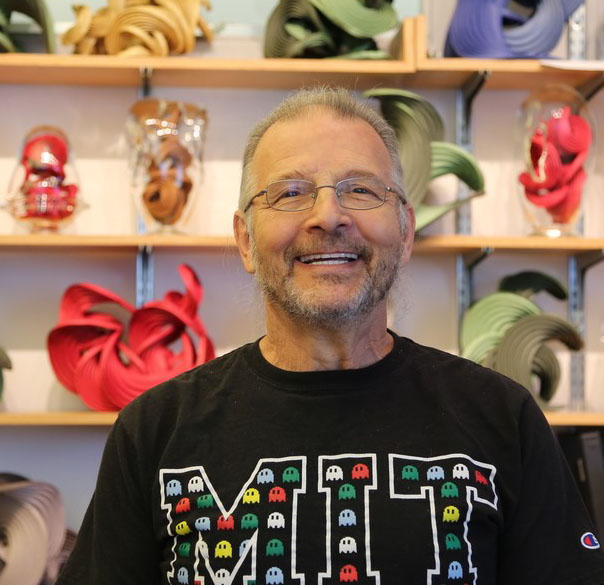 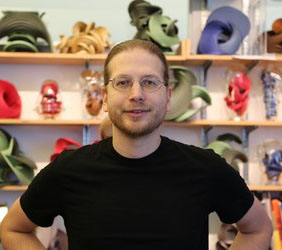 |
Martin Demaine is an artist and mathematician, and the Angelika and Barton Weller artist in residence at the Massachusetts Institute of Technology. After studying glassblowing in England, he started the first private hot glass studio in Canada and has been called the father of Canadian glass. Demaine's pieces from this period are represented in the permanent collections of half a dozen major museums including the Canadian Museum of Civilization and the National Gallery of Canada. Erik Demaine is a Professor in Computer Science at the Massachusetts Institute of Technology. Demaine's research interests range throughout algorithms, from data structures for improving web searches to the geometry of understanding how proteins fold to the computational difficulty of playing games. He received a MacArthur Fellowship as a “computational geometer tackling and solving difficult problems related to folding and bending—moving readily between the theoretical and the playful, with a keen eye to revealing the former in the latter”. He appears in the origami documentaries Between the Folds and NOVA's The Origami Revolution, cowrote a book about the theory of folding (Geometric Folding Algorithms), and a book about the computational complexity of games (Games, Puzzles, and Computation). Together, Martin and Erik’s interests span the connections between mathematics and art, including curved-crease sculptures in the permanent collections of the Museum of Modern Art in New York, and the Renwick Gallery in the Smithsonian. They recently won a Guggenheim Fellowship (2013) for exploring folding of other materials, such as hot glass. |
Puzzles and Games Meet Algorithms and Complexity
One hypothesis for why humans like to play games and solve puzzles is that they enjoy the challenge. We can formalize the notion of challenge using computational complexity theory: if it's challenging for even a computer to play perfectly, then it's going to be challenging for a human as well. I will describe several such results, for example, that Tetris and Rubik's Cubes are NP-complete, while Super Mario Bros., Mario Kart, and Rush Hour are PSPACE-complete, which essentially means that you can build typical computers inside these games. Proving these hardness results is itself a fun kind of game/puzzle, where we need to construct pieces of game levels to implement pieces of a computer, like memory and wires. On the other hand, some puzzles and games can be solved by efficient computer algorithms, yet are still challenging for humans. In both cases, we can use the improved mathematical understanding to design new puzzles or levels.
Suzanne DoréeAugustana University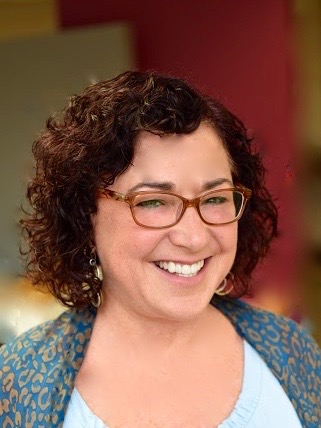 |
Suzanne Dorée is Professor of Mathematics and chair of the Department of Mathematics, Statistics, and Computer Science at Augsburg University in Minneapolis where she has taught since 1989. She earned her Ph.D. in Character Theory from the University of Wisconsin-Madison. Her research interests include curriculum and materials development and directing undergraduate research in combinatorics. She enjoys teaching mathematics at all levels using pedagogies that support active and inquiry-based learning. Dr. Dorée is active in the Mathematical Association of America, currently serving as Chair of the MAA Congress and Chair of the Council on Programs and Students. An avid gardener, cook, and designer, she appreciates the importance of getting her hands dirty, and not just in mathematics. |
Invited Talk: Writing Numbers as the Sum of Factorials
In standard decimal notation, we write each integer as the linear combination of powers of 10. In binary, we use powers of 2. What if we used factorials instead of exponentials? How can we express each integer as the sum of factorials in a minimal way? This talk will explore the factorial representation of integers, including historical connections to permutations, a fast algorithm for conversion, and the secret of the “third proof by mathematical induction.” Next we’ll extend this representation to rational and then real numbers, ending with some remaining open questions.
Workshop Presentation: Turning Routine Exercises into Activities that Teach Mathematical Inquiry
Asking questions, checking examples, making conjectures, and constructing counterexamples are part of any mathematician's toolkit and important skills for our students to learn. The MAA CUPM curriculum guide agrees, calling us to ``include activities designed to promote student's progress in learning to . . . assess the correctness of solutions, create and explore examples, carry out mathematical experiments, and devise and test conjectures'' with the goal that ``students should develop mathematical independence and experience open-ended inquiry.'' How do we help students develop inquiry skills and ignite their curiosity about mathematics? In this professional development workshop we explore some practical strategies you can use to transform routine textbook exercises emphasizing procedural fluency and basic conceptual understanding into activities that teach inquiry. Come ready to try your hand at creating inquiry-based activities.
Skip GaribaldiCenter for Communication Research for Institute for Defense Analsyis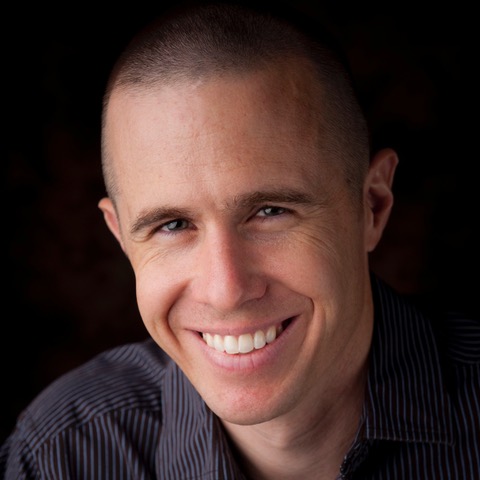 |
Skip Garibaldi's interest in mathematical aspects of the lottery was ignited by teaching finite probability to UCLA undergrads in the early 2000s, by trying to justify the seemingly-obvious statement that buying lottery tickets is a poor investment. Since then, Skip has received the MAA's Lester Ford Award for his work, assisted reporters with lottery-related investigations, and appeared on news shows such as 20/20. In the academic world, he is known for his work on E8, on other algebraic groups, and on cohomological invariants. Skip is Director of IDA's Center for Communications Research in La Jolla. |
Lottery Tales
The numbers involved in the lottery can be astronomical (such as the value of the jackpot and the number of tickets sold) or infinitesimal (such as the odds of winning), reflecting various underlying heavy-tailed and highly skewed distributions and defying our intuition's ability to accurately compare the numbers. Questions posed by sociologists, reporters, and law enforcement quickly lead to interesting mathematical questions with real-world conseqeunces. Some of these questions can be answered with thoughtful applications of undergraduate mathematics, statistics, and economics, and lots of questions still await investigation.
Kristin LauterMicrosoft Research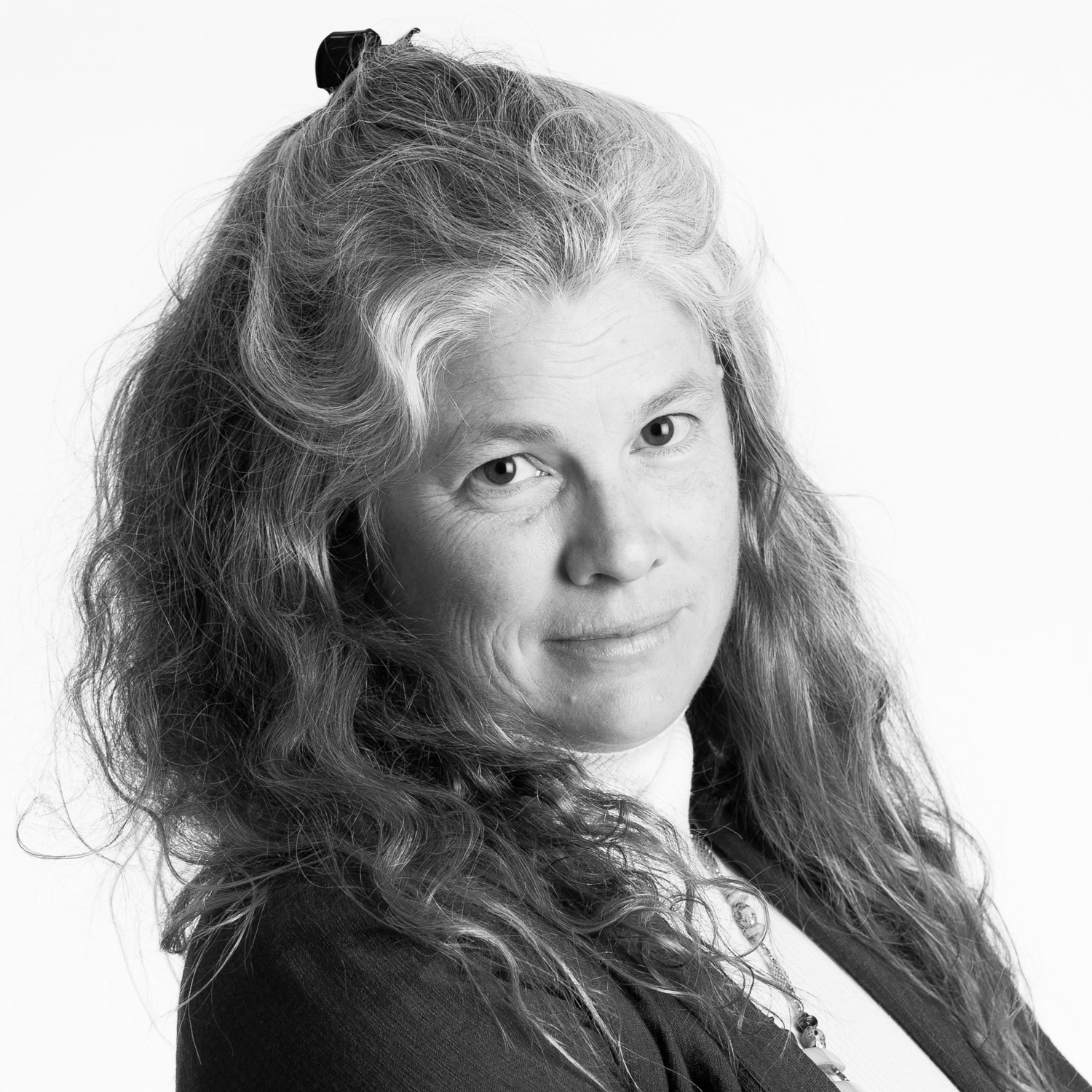 |
Kristin Estella Lauter is a mathematician and cryptographer whose research areas are number theory, algebraic geometry, and applications to cryptography. She is particularly known for her work on homomorphic encryption, elliptic curve cryptography, and for introducing supersingular isogeny graphs as a hard problem into cryptography. She is a Principal Researcher and Research Manager of the Cryptography Group at Microsoft Research in Redmond, Washington. She served as President of the Association for Women in Mathematics from 2015 –2017. She has published more than 100 papers and holds more than 50 patents. Lauter was awarded the Selfridge Prize in Computational Number Theory in 2008 and was elected to the 2015 Class of Fellows of the American Mathematical Society "for contributions to arithmetic geometry and cryptography as well as service to the community." In 2017, she was selected as a fellow of the Association for Women in Mathematics in the inaugural class. She is the 2018-2020 Polya Lecturer for the Mathematical Association of America. Lauter received her BA, MS, and Ph.D degrees in mathematics from the University of Chicago, in 1990, 1991, and 1996, respectively. Prior to joining Microsoft, she held positions as a visiting scholar at Max Planck Institut fur Mathematik in Bonn, Germany (1997), T.H. Hildebrandt Research Assistant Professor at the University of Michigan (1996-1999), and a visiting researcher at Institut de Mathematiques Luminy in France (1999). She is a co-founder of the Women in Numbers Network, a research collaboration community for women in number theory, and she is the lead PI for the AWM NSF Advance Grant (2015-2020) to create and sustain research networks for women in all areas of mathematics. She serves on the Board of Trustees of MSRI, the Advisory Board of the Banff International Research Station and has served on the Council of the American Mathematical Society (2014-2017). |
How to Keep your Secrets in a Post-Quantum World
This talk will give an overview of the history of various hard problems in number theory which are used as the basis for cryptosystems. I will survey the evolution of attacks and discuss the upcoming NIST competition to standardize new cryptographic schemes for a post-quantum world. I will present some current proposals for post-quantum systems based on supersingular isogeny graphs of elliptic curves and lattice-based cryptosystems in cyclotomic number fields. Supersingular Isogeny Graphs were proposed for use in Cryptography in 2006 by Charles-Goren-Lauter, and are currently being considered as candidates for standardization in several tracks of the 2017 NIST Post-Quantum Cryptography International Competition. These are Ramanujan graphs whose nodes are supersingular elliptic curves and edges are isogenies between them.
Darryl YongHarvey Mudd College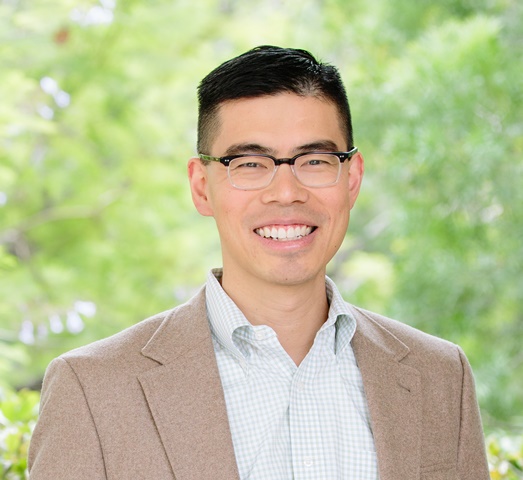 |
Darryl Yong is a Professor of Mathematics at Harvey Mudd College. This year, he is on leave from Harvey Mudd to serve as the Founding Director of the Claremont Colleges Center for Teaching and Learning. Previously, he served as Associate Dean for Diversity at Mudd from 2011-2016 and has served as associate chair of the mathematics department. He received his PhD in applied mathematics at the University of Washington. His scholarly activities focus on the retention and professional development of secondary school mathematics teachers and improving undergraduate mathematics education. He is also passionate about broadening participation in STEM and helping institutions build capacity for increasing diversity and inclusion. Darryl serves on the Steering Committee for Math for America Los Angeles and helps to design professional development for its Fellows. Since 2007, he has also been an instructor for the Secondary School Teacher Program at IAS/Park City Mathematics Institute. |
Active Learning 2.0: Making it Inclusive
Active learning has many documented benefits both for students and instructors. Moreover, there is increasing evidence that it disproportionately benefits women, students of color, and students who previously were denied the same learning opportunities as others. However, the empirical evidence for this disproportionate benefit doesn't explain why it happens, nor does it guarantee that all students will benefit from active learning. In fact, my own experience with active learning is that it is difficult to do well and sometimes it can have detrimental effects on students if we're not careful. So, we should aim not just for active learning, but learning that is both active and inclusive. We'll discuss some principles and practical strategies for making active learning more inclusive.Student Poster Session and Student Contributed Paper Session
Students (undergraduate and graduate) are invited to submit short proposals for the Poster Session of the Spring 2018 Section Meeting of the MAA, taking place on Saturday, April 21 at University of San Diego.
Here are some ideas of what students can present:
- Results of masters thesis, honors, senior, or independent study projects
- Results of classroom projects or modeling contests
- Results of REUs or other summer research programs
- Historical investigations in pure or applied mathematics
- Solutions of problems from the Putnam Exam or from the Monthly or other journals
The Student Resources page of the MAA website has useful articles about writing an abstract and giving presentations. Be sure to check it out for helpful tips! Direct questions to Ryan DeMoss.

